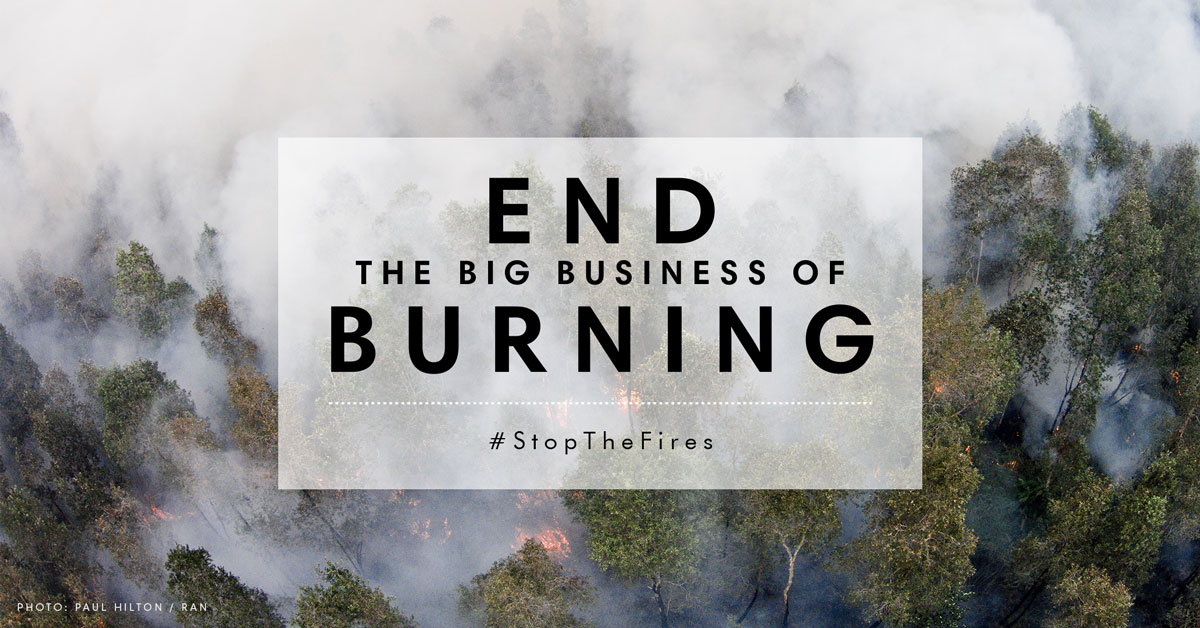As the headlines of Fall 2021 detail one climate disaster after another — increasing hurricanes in the Gulf of Mexico, deadly unprecedented floods in Germany, the hottest temperatures ever recorded in Europe, and wildfires ravaging California, just to name a few — massive fires continue to be intentionally set in Indonesia’s vital rainforests in order to clear land for commodity plantations.
Despite the latest report by the Intergovernmental Panel on Climate Change, decrying our climate crisis as a “Code Red for humanity,” the science- and sanity-defying “fire season” annual ritual continues. Every year, we see the intentional destruction of millions of acres of the world’s rainforests. It creates a devastating cycle: as forests and carbon-rich peatlands are burned, they release an enormous amount of greenhouse gasses into the atmosphere. At the same time, this destroys the very trees and peatlands that could absorb carbon and safely store it in the ground. In other words, we continue to throw gasoline onto the fires of climate chaos.
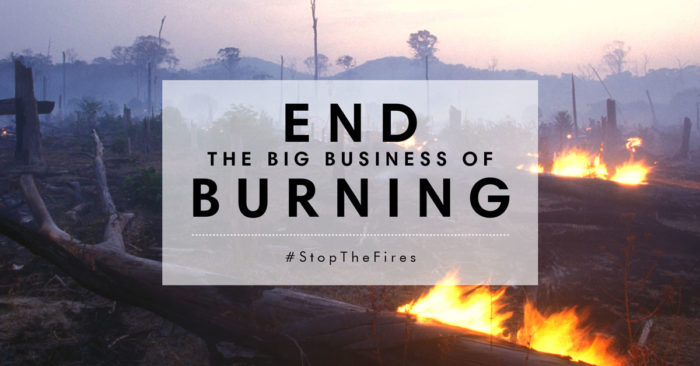
Major Brands’ and Banks’ Contribution to Indonesia’s Forest Fires
In 2019 alone, over 7.6 million acres were burned in Indonesia, 31% of which were peatlands. One of the biggest culprits for fires in Indonesia is the Royal Golden Eagle (RGE) Group of companies. The RGE Group is a large conglomerate, headed up by billionaire Mr. Sukanto Tanoto, which controls millions of acres of land used for both pulp and palm oil production.
Despite its track record of industrial-scale deforestation, unresolved community conflicts, human rights abuses, tax-evasion, and violation of laws prohibiting fires and protecting carbon-rich peatlands, RGE continues to operate as if it is a responsible corporation. The palm oil companies of the RGE Group continue to supply major Brands such as Procter & Gamble, Kao, Mondelēz, Ferrero, Colgate Palmolive, Unilever and Nestlé with palm oil. RGE continues to receive financing from major global banks such as Mitsubishi UFJ Financial Group (MUFG), Industrial and Commercial Bank of China (ICBC) and ABN Amro (the Banks). RGE Group’s palm oil arm APICAL also maintains its joint venture partnership with Kao, despite the controversies surrounding RGE.
Research undertaken by RAN, shows that by doing business with the RGE group of companies these Brands and Banks have contributed to fires destroying an estimated 230,000 acres of forests in Indonesia between 2015 and 2021. During the last fire season, thousands of concerned individuals across the globe called on these Brands to suspend business with the RGE group.
Brands and banks need to suspend their business with RGE
To date, not a single company has suspended sourcing from RGE group and RGE’s palm oil divisions continue to be named in the supplier lists of household brands. Most of these Brands have also failed to disclose details of the pulp mills in their supply chains — meaning that we cannot confirm if they source products from RGE’s pulp companies, including APRIL and Toba Pulp Lestari.
Procter & Gamble is one of the worst performing laggards responsible for sourcing palm oil from the RGE group and, in doing so, contributing to these forest fires. Join us as we call on P&G to suspend sourcing from the Royal Golden Eagle group.
The Banks have also failed to take an adequate response to documented controversies associated with the Royal Golden Eagle group. The detailed research at Forests & Finance shows that between 2016 and April 2020, MUFG, ICBC and ABN Amro provided US $518 million in credit to RGE. Yet both MUFG and ABN Amro have a “No Deforestation, No Peat, and No Exploitation” (NDPE) policy for their palm oil financing — which are completely at odds with their relationship with RGE.
MUFG is one of a syndicate of banks that recently contributed to a new USD 750 million so-called “sustainability loan” to a major RGE palm oil arm division called APICAL. While ABN Amro has decided to discontinue all commodity financing globally, it remains exposed to the destructive activities of Sukanto Tanoto’s RGE group. Further, as a signatory to the United Nations’ “Principles for Responsible Banking” (PRB), the Dutch bank has a responsibility to engage its long term client to secure remedies for social and environmental harms. ICBC is also a signatory to UN Principles on Responsible Banking (UN-PRB) which commits it to aligning lending with the goal of halting deforestation by 2020. ICBC has still not published any policies — such as an NDPE policy — to explain how it will stop finance flowing to companies involved in deforestation.
Royal Golden Eagle group’s legacy of forest fires in Indonesia
Rainforest Action Network undertook an analysis to determine the extent of forest fires in the palm oil and pulp plantations of the Royal Golden Eagle group and its network of connected forestry and agribusiness companies in Indonesia. We found that the RGE group has contributed to fires destroying over 230,000 acres of forests between 2015 and 2021. These fires were ablaze in the concession areas controlled by its publicly declared companies, such as APRIL, and companies that we have uncovered as being connected to the RGE group through either Mr. Sukanto Tanoto — the founder, chairman and ultimate beneficiary of the Royal Golden Eagle group — or a complex web linking a number of companies to corporate entities and individuals associated with the RGE and its publicly listed entities such as APRIL. Each case uncovered presents evidence of family, financial or management control and/or shared resources between these “RGE-connected” companies that are responsible for the most severe forest fires and the RGE group. In Indonesia’s forestry and agribusiness sectors it is common practice for major conglomerates to hide their true ownership or connections with companies that continue to expand and engage in controversial practices through opaque ownership structures and offshore holdings. These companies are known as ‘shadow companies’.
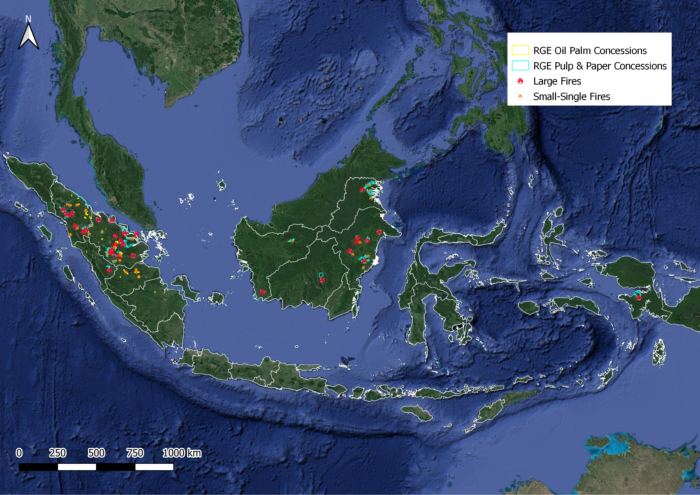
The map above presents the results of our research and shows that fires have occurred inside pulp and oil palm plantations of the RGE group across Indonesia. This analysis was conducted using fire data from between June 2, 2015 and June 15, 2021. The map identifies areas that have been burned by fires inside the boundaries of concessions allocated to companies that are known subsidiaries or shadow companies connected to RGE. NASA VIRS alerts of fires were collated and satellite imagery was used to determine how much land has been burned by each fire. The duration of the fires was determined by checking the satellite imagery on multiple dates after the fire had begun, to identify when the burning had stopped.
A key finding is that most of the large fires in RGE’s concessions were within pulp and paper concessions. The map below shows that the island of Sumatra has been an epicenter of fires occurring within RGE’s concessions. Fires have left scars across land operated by RGE’s pulp arm called APRIL and companies connected to RGE, such as PT. Sumatera Riang Lestari and PT. Sumatera Sylva Lestari. Our analysis found that 18,362 acres were burned within concessions controlled by APRIL’s subsidiaries, PT. Riau Andalan Pulp & Paper. PT. Sumatera Riang Lestari and PT. Sumatera Sylva Lestari are both part of the Sumatera Dinamika Utama Group, which is connected to RGE via pulp suppliers and a network of former employees and directors. Both have been among the worst offenders. All three companies have had sanctions filed against them by the government of Indonesia.
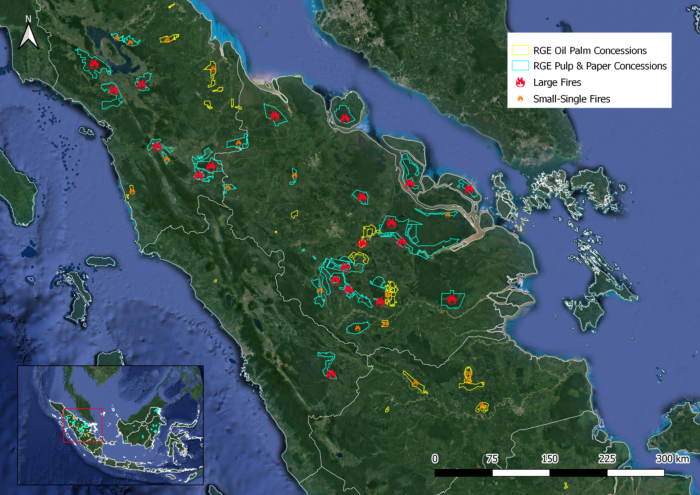
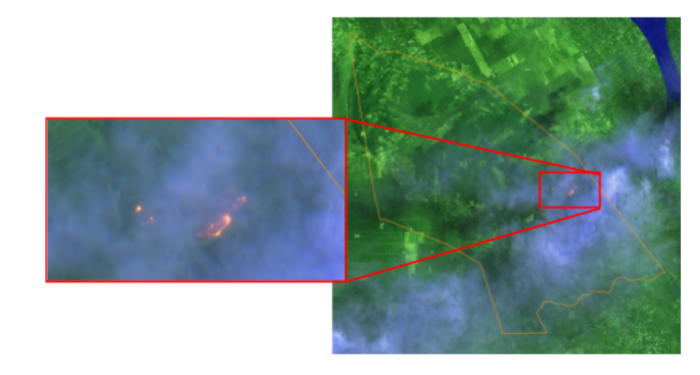
PT. Toba Pulp Lestari Tbk (TPL) is another RGE-connected company in violation of its own ‘No Burn’ policy on the island of Sumatra. Within PT. Toba Pulp Lestari’s concessions, an estimated total of 3,862 acres of land was burned in 2016, 2018, and 2020. When asked to comment on our findings, PT. TPL stated that it has a strict no burn policy and recorded 590 acres of forest fires from 2015 until 2020 with the largest areas burnt in 2016. The company says that these fires were either accidents caused by external parties or had spread from community plantations.
Further, PT. TPL denied being part of the RGE group of companies, saying that it is a “public(ly) listed company in Indonesia with its own Independent Board and Management team.” Our research suggests however that PT. TPL is a RGE-connected company as Mr. Sukanto Tanoto is its ultimate beneficiary. PT. TPL was formerly known as PT. Inti Indorayon Utama. It was owned by Mr. Sukanto Tanoto until it was shut down by a former President of Indonesia due to a social conflict. In 2004, the company changed its name to PT. Toba Pulp Lestari. In 2007, Sukanto Tanoto sold his shares in the company to Pinnacle Company Limited. According to PT. TPL’s 2020 annual report, Pinnacle Company, APRIL and other subsidiaries of the RGE group are listed as related parties that are under ‘common control’.
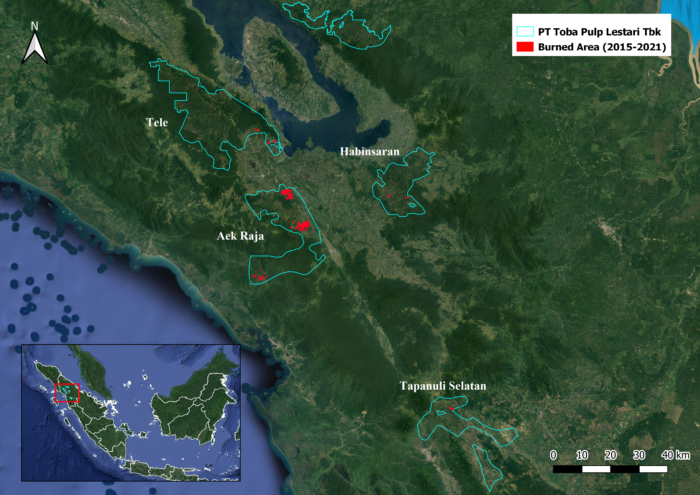
RGE’s impact on Indonesia forests has continued to expand to the eastern islands where fire impacts are seen across Kalimantan, on the island of Borneo. The maps below show the extent of large fires is greatest in the provinces of North and East Kalimantan. These are the provinces where the concessions of PT. ITCI Hutani Manunggal, which is owned by the same entities as RGE, and RGE-connected company groups Nusantara Fiber and PT. Adindo Hutani Lestari are located. The fire extent is greatest in areas controlled by Nusantara Fiber within the concessions of PT. Permata Hijau Khatulistiwa, PT. Bakayan Jaya Abadi, PT. Mahakam Persada Sakti and PT. Santan Borneo Abadi.
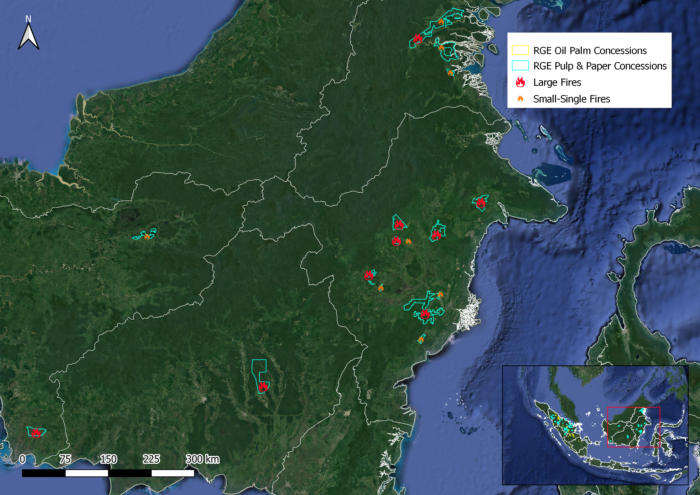
Our research found that PT. ITCI Hutani Manunggal (IHM) is owned by the same entities as RGE. Itci Kartika Utsama and Inhutani I formed IHM in 1993. Itci Kartika Utsama then sold shares to a subsidiary of APRIL called PT. Kreasi Lestari Pratama. Recent reports by Indonesia’s Tempo magazine state that 90% of IHM shares are now in the hands of Sukanto Tanoto and the RGE group. The Indonesian Government now plans to use part of the IMN pulp concession in East Kalimantan as the location of its new capital city. The concession is also a known supplier to APRIL’s pulp mill.
Nusantara Fiber and PT. Adindo Hutani Lestari (“PT. AHL”) have undisclosed owners, but reports published by Aidenvironment and Koalisi Anti Mafia Hutan, Rainforest Action Network, and Greenpeace allege connections with RGE, rely on official government business registration documentation, supply chain links, and evidence of closely interlinked connections with shareholders of the companies via former employees and directors of RGE companies.
RGE and APRIL continue to deny that these are RGE-connected companies but, as further explained below, neither has responded to requests to provide evidence to refute reported links between RGE and these companies. RGE rejects the contention that the past employment by RGE of two of the three founder directors of Nusantara Fiber constitutes or contributes to any ongoing connection between the corporations. Further, RGE specifically denies having any supply chain connection to the Nusantara Fiber Group companies. APRIL states that no shareholdings of PT. AHL have ever been held by shareholders RGE or APRIL.
However, APRIL and RGE have not replied in detail regarding several connections between PT. AHL and RGE, detailed in the report titled “Sustaining deforestation: APRIL’s links with PT. Adindo Hutani Lestari Undercut “no deforestation” Pledge”. The report presented substantial evidence of commissioners, directors and shareholders in PT. Adindo’s current ownership structure (Mr. Protasius Daritan, Mr. Hartanto Wisastra, Mr. Dedy Sutanto and Mr. Ferdinand Flores) holding positions with RGE, APRIL and/or RGE-related companies. For example, Mr. Protasius Daritan is listed as one of the ‘senior leaders of RGE Indonesia’ in the Tanoto Foundation’s 2015 Annual Report. Further, according to the Offshore Leaks Database, Protasius Daritan has been connected to other offshore RGE companies and Sukanto Tanoto.
More recently, the RGE-connected Sumatera Dinamika Utama group of companies has expanded its operations into the Indonesian province of Papua through its plantation company PT. Kesatuan Mas Abadi. Mr. Sukanto Tanoto and his wife Tinah Bingei are named as the original shareholders and founders of PT. Kesatuan Mas Abadi and remained equal shareholders between 1997 and 2008. The infrared satellite images below show fires in Papua covering 402 acres on July 19th, 2019.
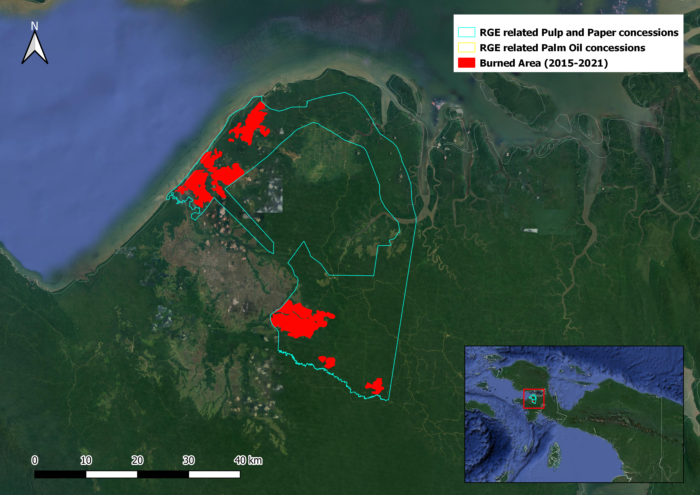
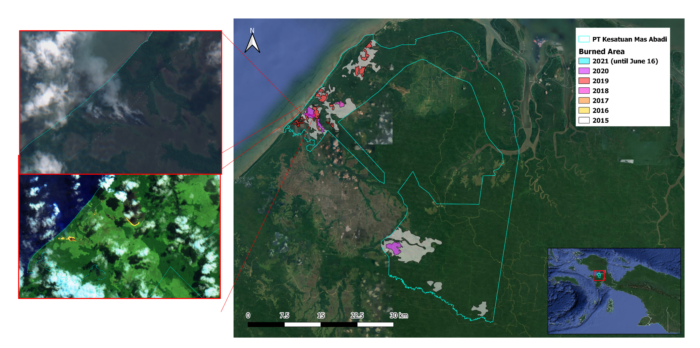
The table below presents the areas burned within RGE concessions each year between 2015 and 2021, including in the concessions of companies owned by the same entities as RGE and RGE-connected companies. These are Nusantara Fiber Group, Sumatra Dinamika Utama Group and PT. Adindo Hutani Lestari. The annual figures show 2015, 2016, and 2019 to be the years with the greatest areas burned inside RGE concessions.
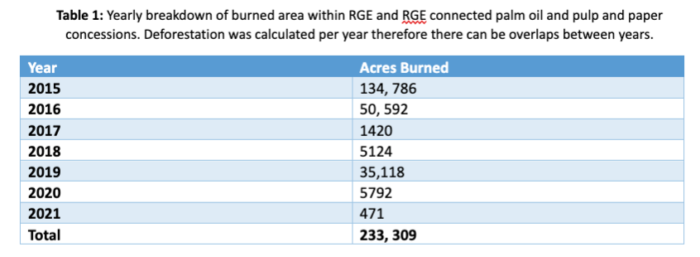
2015 – the worst year for forest fires inside RGE concessions
2015 was one of the worst years for forest fires inside RGE and its connected companies’ concessions — a total of 134,786 acres of Indonesia’s rainforests were burnt. During this year alone, over 1,828 acres of forests burned inside RGE’s palm oil concession areas. RGE’s palm oil companies include the oil palm grower Asian Agri and the palm oil refiner Apical. These fires occurred in the concession of PT. Pusaka Megah Buminusantara (PT. PBN).
When invited to comment on our findings, Asian Agri stated that PT. PBN is not part of Asian Agri rather that it is one of its FFBs suppliers for its CPO mills in Riau and to date has had no fires in its concession. However, notary acts list the ultimate beneficiary owner of PT. PBN as Asianagri Limited, which is registered in Labuan, a known secrecy jurisdiction of Malaysia. The name suggested this company was owned by Asian Agri, yet it has undisclosed owners so this can not be confirmed. However, notary acts list two individuals (Welly Pardede and Rudy Rismanto) as the Director and Commissioner of the company, respectively. The same two individuals hold similar management positions in PT. Dasa Anugrah Sejati, PT. Rigunas Agri Utama, PT. Mitra Unggul Pusaka and PT. Tunggal Yunus Estate –– companies listed as Asian Agri subsidiaries in their 2019 – 2020 sustainability report. Another RGE-connected company in the palm oil sector is the company group Anugrah Superventure that has 30 palm oil mills and/or kernel crushers in Indonesia. The Offshore Leaks Database of the ICIJ links part of this group to Mr. Sukanto Tanoto.
The decrease in fires inside RGE concessions following the 2015 megafires in Indonesia is consistent with the national statistics of fire. This decline is believed to have resulted from government sanctions and issuance of the Indonesian Government Regulation Number 57 on the Protection and Management of Peatland Ecosystems (PP. 57/2016). This regulation was issued in 2016 and aimed at restoring and protecting peatlands from fires and degradation. Issued as part of a response to the 2015 haze crisis, it designated 30.6 million acres of peatland to be restored and included many industrial pulp plantations concessions within Sumatra and Kalimantan. The regulation was designed to make companies within designated protection zones reconsider their long-term management plans and annual working plans for plantation development. However, in 2019 a decree issued by the Ministry of Environment and Forestry (KLHK) is believed to have weakened the peat protection established by the government of Indonesia. This is perhaps why in 2019 fires became much worse across Indonesia, which is reflected in both the RGE concessions and national statistics. Concerns also remain on the lack of consistent use of sanctions against RGE and other offending companies violating laws prohibiting fires in Indonesia and the lack of government action to enforce the payment of fines.
Risks to major brands and banks through association with Royal Golden Eagle group
The reputations of the Brands and Banks face massive risks through association with Royal Golden Eagle group. These Brands must suspend sourcing from the Royal Golden Eagle group; these Banks must suspend any new financing of the Royal Golden Eagle group. All business relationships must be suspended at a corporate group level until the RGE Group, and all its subsidiaries and connected companies, take immediate and verified action to comply with the Brands’ and Banks’ policies. The RGE group must strengthen its policies and procedures to align with No Deforestation, No Peatland and No Exploitation benchmarks. They must prove independently verified compliance with a set of preconditions, including ending fires and deforestation in the concessions of all RGE-connected companies and third party suppliers. They must take steps to remedy harm and resolve conflicts with communities, including the return of community lands affected by its plantation developments, and restore vast areas of peatlands.
Saving these rainforests is a matter of planetary urgency — and pressure is building on the Brands and Banks to take action. Consumers and investors alike are demanding these Brands and Banks accelerate actions to address the conversion, logging and burning of rainforests. Procter & Gamble is one of the worst performing laggards responsible for sourcing palm oil from the RGE group and, in doing so, contributing to these forest fires. Join us as we call on P&G to suspend sourcing from the Royal Golden Eagle group.
Royal Golden Eagle refutes findings
Rainforest Action Network provided the Royal Golden Eagle group with an opportunity to comment on the findings set out in this blog. In addition to the replies from Asian Agri and PT. Toba Pulp Lestari reflected above, we received replies from RGE and APRIL. Read more about the responses, including sources, here.
